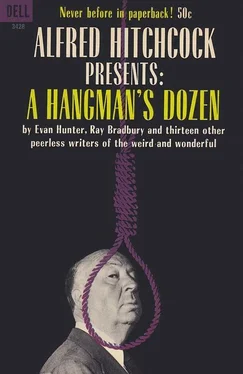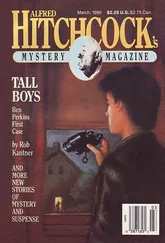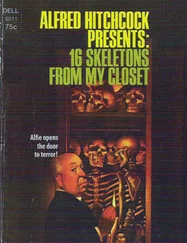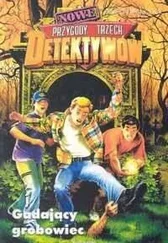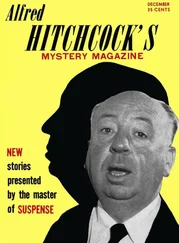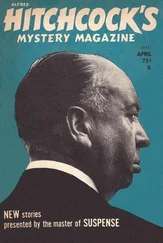While he ate, warily but decidedly, Mr. Ketchum tried to figure out the motivation behind this magnificent breakfast.
It was the rural mind again. They regretted their blunder. It seemed a flimsy notion, but there it was. The food was superb. One thing you had to say for these New Englanders; they could cook like a son-of-a-gun. Breakfast for Mr. Ketchum was usually a sweet roll heated, and coffee. Since he was a boy in his father’s house he hadn’t eaten a breakfast like this.
He was just putting down his third cup of well-creamed coffee when footsteps sounded in the hall. Mr. Ketchum smiled. Good timing, he thought. He stood.
Chief Shipley stopped outside the cell. “Had your breakfast?”
Mr. Ketchum nodded. If the chief expected thanks he was in for a sad surprise. Mr. Ketchum picked up his coat.
The chief didn’t move.
“Well...?” said Mr. Ketchum after a few minutes. He tried to put it coldly and authoritatively. It came out somewhat less.
Chief Shipley looked at him expressionlessly. Mr. Ketchum felt his breath faltering.
“May I inquire—?” he began.
“Judge isn’t in yet,” said Shipley.
“But...” Mr. Ketchum didn’t know what to say.
“Just came in to tell you,” said Shipley. He turned and was gone.
Mr. Ketchum was furious. He looked down at the remains of his breakfast as if they contained the answer to this situation. He drummed a fist against his thigh. Insufferable! What were they trying to do — intimidate him? Well, by God—
— they were succeeding.
Mr. Ketchum walked over to the bars. He looked up and down the empty hallway. There was a cold knot inside him. The food seemed to have turned to dry lead in his stomach. He banged the heel of his right hand once against the cold bar. By God! By God!
It was two o’clock in the afternoon when Chief Shipley and the old policeman came to the cell door. Wordlessly the policeman opened it. Mr. Ketchum stepped into the hallway and waited again, putting on his coat while the door was relocked.
He walked in short, inflexible strides between the two men, not even glancing at the picture on the wall. “Where are we going?” he asked.
“Judge is sick,” said Shipley. “We’re taking you out to his house to pay your fine.”
Mr. Ketchum sucked in his breath. He wouldn’t argue with them; he just wouldn’t. “All right,” he said, “if that’s the way you have to do it.”
“Only way to do it,” said the chief, looking ahead, his face an expressionless mask.
Mr. Ketchum pressed down the corners of a slim smile. This was better. It was almost over now. He’d pay his fine and clear out.
It was foggy outside. Sea mist rolled across the street like driven smoke. Mr. Ketchum pulled on his hat and shuddered. The damp air seemed to filter through his flesh and dew itself around his bones. Nasty day, he thought. He moved down the steps, eyes searching for his Ford.
The old policeman opened the back door of the police car and Shipley gestured toward the inside.
“What about my car?” Mr. Ketchum asked.
“We’ll come back here after you see the judge,” said Shipley.
“Oh. I...”
Mr. Ketchum hesitated. Then he bent over and squeezed into the car, dropping down on the back seat. He shivered as the cold of the leather pierced trouser wool. He edged over as the chief got in.
The policeman slammed the door shut. Again that hollow sound, like the slamming of a coffin lid in a crypt. Mr. Ketchum grimaced at the simile.
The policeman got into the car and Mr. Ketchum heard the motor cough into liquid life. He sat there breathing slowly and deeply while the policeman out-choked warmth into the engine. He looked out the window at his left.
The fog was just like smoke. They might have been parked in a burning garage. Except for that bone-gripping dampness. Mr. Ketchum cleared his throat. He heard the chief shift on the seat beside him.
“Cold,” Mr. Ketchum said, automatically.
The chief said nothing.
Mr. Ketchum pressed back as the car pulled away from the curb, V-turned and started slowly down the fog-veiled street. He listened to the crisp sibilance of tires on wet paving, the rhythmic swish of the wipers as they cleared off circle segments on the misted windshield.
After a moment he looked at his watch. Almost three. Half a day shot in this blasted Zachry.
He looked out through the window again as the town ghosted past. He thought he saw brick buildings along the curb but he wasn’t sure. He looked down at his white hands, then glanced over at Shipley. The chief was sitting stiffly upright on the seat, staring straight ahead. Mr. Ketchum swallowed. The air seemed stagnant in his lungs.
On Main Street the fog seemed thinner. Probably the sea breezes, Mr. Ketchum thought. He looked up and down the street. All the stores and offices looked closed. He glanced at the other side of the street. Same thing.
“Where is everybody?” he asked.
“What?”
“I said where is everybody?”
“Home,” the chief said.
“But it’s Wednesday,” said Mr. Ketchum. “Aren’t your — stores open?”
“Bad day,” said Shipley. “Not worth it.”
Mr. Ketchum glanced at the sallow-faced chief, then withdrew his look hastily. He felt cold premonition spidering in his stomach again. What in God’s name is this? he asked himself. It had been bad enough in the cell. Here, tracking through this sea of mist, it was altogether worse.
“That’s right,” he heard his nerve-sparked voice saying. “There are only sixty-seven people, aren’t there?”
The chief said nothing.
“How... h-how old is Zachry?”
In the silence he heard the chief’s finger joints crackle dryly.
“Hundred fifty years,” said Shipley.
“That old,” said Mr. Ketchum. He swallowed with effort. His throat hurt a little. Come on, he told himself. Relax.
“How come it’s named Zachry?” The words spilled out, uncontrolled.
“Noah Zachry founded it,” said the chief.
“Oh. Oh. I see. I guess that picture in the station...?”
“That’s right,” said Shipley.
Mr. Ketchum blinked. So that was Noah Zachry, founder of this town they were driving through—
— block after block after block. There was a cold, heavy sinking in Mr. Ketchum’s stomach as the idea came to him.
In a town so big, why were there only 67 people?
He opened his mouth to ask it, then couldn’t. The answer might be wrong.
“Why are there only—?” The words came out anyway before he could stop them. His body jolted at the shock of hearing them.
“What?”
“Nothing, nothing. That is—” Mr. Ketchum drew in a shaking breath. No help for it. He had to know.
“How come there are only sixty-seven?”
“They go away,” said Shipley.
Mr. Ketchum blinked. The answer came as such an anti-climax. His brow furrowed. Well, what else? he asked himself defensively. Remote, antiquated, Zachry would have little attraction for its younger generations. Mass gravitation to more interesting places would be inevitable.
The heavy man settled back against the seat. Of course. Think how much I want to leave the dump, he thought, and I don’t even live here.
His gaze slid forward through the windshield, caught by something. A banner hanging across the street. BARBECUE TONIGHT. Celebration, he thought. They probably went berserk every fortnight and had themselves a rip-roaring taffy pull or fishnet-mending orgy.
“Who was Zachry anyway?” he asked. The silence was getting to him again.
“Sea captain,” said the chief.
“Oh?”
“Whaled in the South Seas,” said Shipley.
Читать дальше
